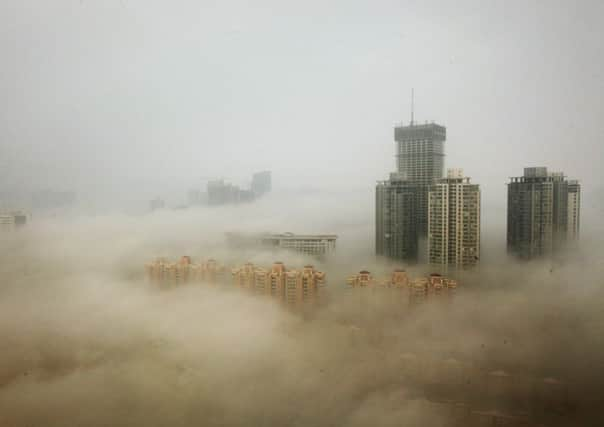Positive spin on China’s smog crisis backfire


In online articles, state broadcaster CCTV and the widely read tabloid the Global Times, published by the Communist Party’s official People’s Daily, tried to put a positive spin on the smog problem.
The Global Times said smog could be useful in military situations, as it could hinder the use of guided missiles – giving the example of smoke used by Serbian forces against Nato airstrikes in the Kosovo war.
Advertisement
Hide AdAdvertisement
Hide AdMeanwhile, broadcaster CCTV listed five “unforeseen rewards” for smog, including helping Chinese people’s sense of humour.
While both pieces have since been deleted from their websites, Chinese newspapers lost little time in denouncing their tone, in an unusual case of state media criticising other state media, reflecting wider public anger.
“Is the smog supposed to lift if we laugh about it?” opined Beijing Business Today, published by the city government’s official Beijing Daily. “Smog affects our breathing. We hope it does not affect our thinking.”
The Dongguan Times, from a heavily industrial city close to the border with Hong Kong, said CCTV’s comments were so bizarre people did not know “whether to laugh or cry”.
“There’s nothing funny about the health dangers of smog,” it declared.
Even the main Xinhua news agency – which had initially picked up CCTV’s commentary – weighed in, writing on one of its official microblogs late on Monday that it was “totally inappropriate” to make fun of air pollution.
Air quality in cities is of increasing concern to China’s stability-obsessed leaders, anxious to douse potential unrest as a more affluent urban population turns against a growth-at-all-costs economic model that has poisoned much of China’s air, water and soil.
The top US environmental regulator, on a visit to Beijing, said that China was trying to deal with the same sort of problems the United States once faced.
Advertisement
Hide AdAdvertisement
Hide Ad“We have to acknowledge that significant pollution challenges are being faced today in China,” environmental protection agency administrator Gina McCarthy told students at Tsinghua University yesterday. “The thing is, not too long ago, the US faced similar challenges.”
Large parts of eastern China, including its prosperous and cosmopolitan commercial capital Shanghai, have been covered in smog over the past week or so. The provincial government has cancelled flights, closed schools and forced cars off the road – and also warned children and the elderly to stay indoors. A cold front arriving yesterday saw the pollution start to clear.
Users of Sina Weibo, China’s answer to Twitter, also vented their outrage over the CCTV and Global Times’ comments.
“The smog crisis covering large parts of China has revealed the failure of the government’s development strategy of only going after GDP [growth]. CCTV is shameless in trying to cover up for their masters,” wrote Wu Bihu, a professor at the elite Peking University.
“It is a public tragedy that half of China is engulfed in smog, wrote one Weibo user. “We should not entertain ourselves by this tragedy.” Wrote another: “The smog weather makes CCTV much stupider. They always treat us as fools.”
Another reader who commented said: “But enemies wouldn’t need to resort to missile attacks if the smog continues to increase – people will simply be poisoned to death.”
CCTV’S PLUSES
1 It unifies the Chinese people.
2 It makes China more equal.
3 It raises citizen awareness of the cost of China’s
4 It makes people funnier.
5 It makes people more knowledgeable (of things like meteorology and the English word haze).